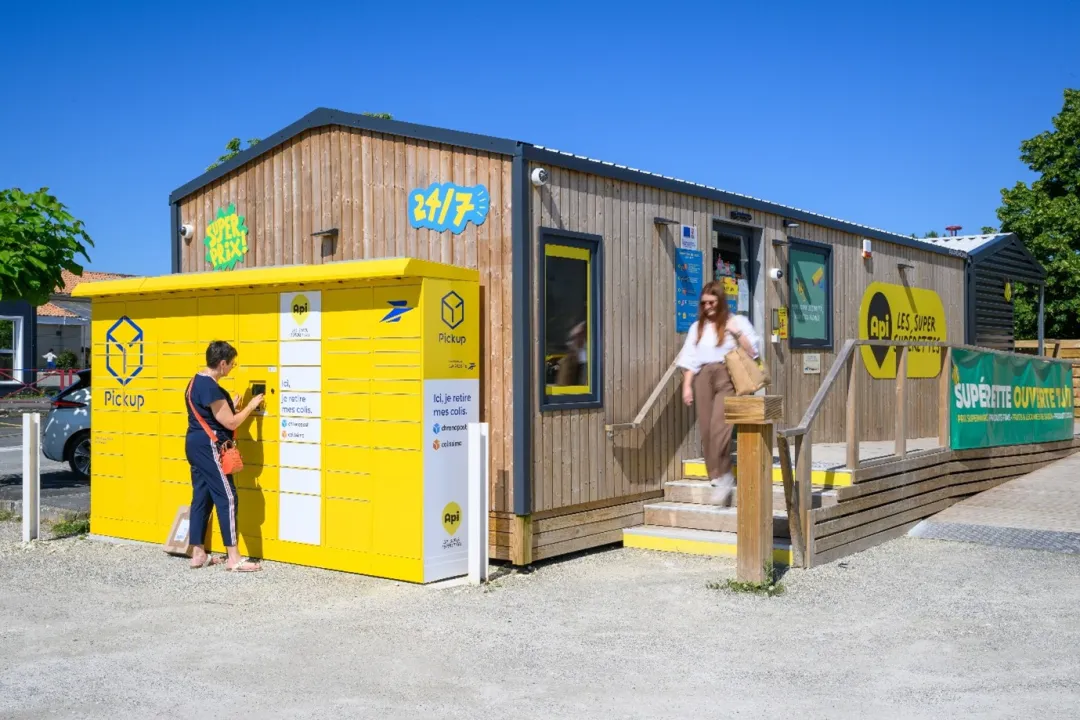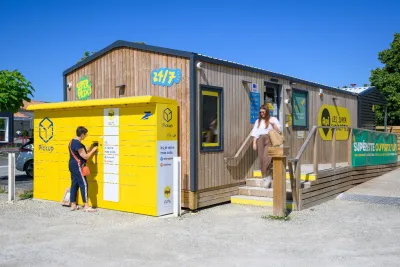Summary
The Api Distribution company installs self-service mini-supermarkets in rural villages where no local shops are available. These stores operate 24/7 and offer around 700 everyday products at supermarket prices. Each unit is an eco-designed, French-made bungalow that consumes no running water and emits 15% less carbon than a traditional store.
This retail solution works without staff on-site and fits easily into village spaces. Api sources a large share of its goods from producers within a 50 km range and prioritises affordability, accessibility, and sustainability. The project kicked off in the Nouvelle-Aquitaine region, operates nearly 100 shops in 2025 and plans to expand further across France.
Results
- Api employs over 95 people, with 80% of staff based in the Nouvelle-Aquitaine region. It operates nearly 100 stores in rural villages, restoring daily access to essential goods for thousands of residents. Around 100 000 customers use the stores which enable them to shop locally, on foot, without relying on a car or public transport.
- Api has established supply relationships with more than 250 producers located within 50 kilometres of its shops, boosting the visibility and income of local farms and artisans. A significant proportion of the products available in Api stores come from sustainable farming or organic production, while efforts are made to encourage healthy eating through product selection criteria.
- In 2024 and early 2025, the company organised over 400 community activities in partner villages. It also ran healthy eating workshops for 700 children in schools located in rural areas where Api stores are present.
- Customer satisfaction is high. Api’s Net Promoter Score (NPS) is 77/100, which is considered exceptional in the food retail sector. Municipal leaders working with Api rate their satisfaction at 8.9 out of 10.
Resources
Documents
Context
The Api Distribution company operates in rural areas of western France, especially in villages where traditional grocery stores have closed. These closures have left local populations, particularly elderly people and those without personal transport, without access to essential products. Villages with no remaining commercial activity face increasing social isolation, reduced quality of life, and high dependency on cars for basic errands.
The project kicked off in the Nouvelle-Aquitaine region to address these challenges. Api restores access to groceries and other necessities through low-carbon, automated shops installed directly inside villages.
Objectives
The core objective of the project is to restore reliable, affordable access to groceries in rural areas that lack shops. Specific objectives include:
- improving daily access to food and essential goods close to home;
- offering affordable products in line with supermarkets pricing;
- minimising travel-related emissions by placing shops within walking distance;
- supplying from nearby producers to build short supply chains;
- creating long-term, non-relocatable jobs in rural areas;
- promoting sustainable and responsible food consumption.
Activities, key actors, and timeline
- In July 2021, Api Distribution was founded in the Nouvelle-Aquitaine region with the support of local stakeholders and financial partners. The Banque des Territoires and the Nouvelle-Aquitaine region are shareholders and hold board positions.
- In November 2022, the company opened its first 24/7 self-service convenience store in the village of Claix, Charente.
- Since early 2023, Api has formally integrated Corporate Social Responsibility (CSR – RSE in French) commitments into its operations, aligning its structure with social and environmental priorities.
- In March 2024, Api became a ‘société à mission’, a legal French status for businesses that include social and environmental goals in their corporate purpose.
- In 2025, Api expects to obtain B Corp certification, strengthening its transparency and sustainability commitments.
- Api designs, builds, and installs self-service bungalows that are prefabricated in France. The units are water-free and emit 15% less than a traditional shop.
- The company organises regular events in partner villages and food education workshops for schools.
- Api manages logistics, supply chain, maintenance, and customer service through a rural workforce based in the Nouvelle-Aquitaine region.
- The initiative collaborates with over 250 producers located within 50 km of its shops to supply sustainable and seasonal products.
Success factors/lessons learnt
The success of Api lies in its simplicity, replicability, and embeddedness in the local context. Its unique value proposition – offering affordable, locally sourced, and sustainably delivered essentials 24/7 – meets a critical need in under-served rural areas.
Key success factors include:
- Strong collaboration with municipal authorities and residents;
- Use of low-impact, modular retail infrastructure;
- Commitment to sustainability and local sourcing;
- A mission-driven governance model.
Challenges included adapting logistics and product selection to local contexts and securing trust from rural populations. Opportunities arose through regional funding and positive feedback from communities.
The model is both environmentally and economically sustainable and scalable to similar rural regions across Europe. It demonstrates that thoughtful retail innovation can support rural resilience, improve livelihoods, and maintain service equity.
Contacts
- Lucie Chaplain (CSR Manager), lucie.chaplain@api-masuperette.fr, +33 7 88 34 47 72

